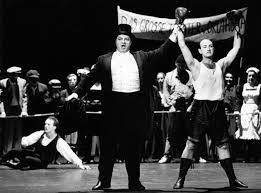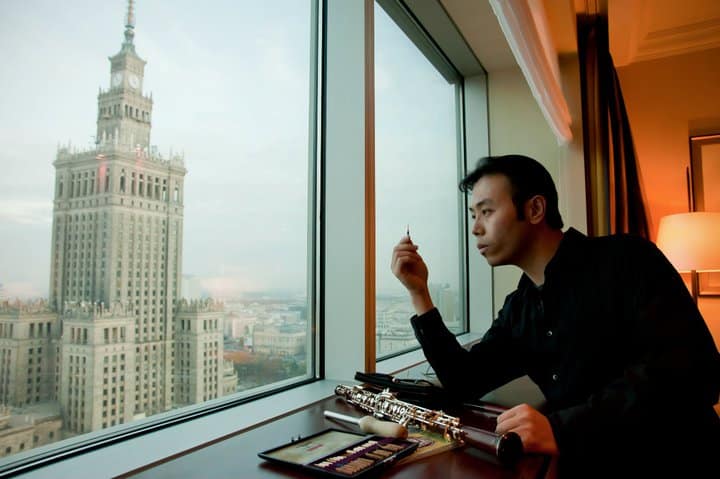Kafka’s America lands in Zurich
OperaTo mark the centennial of Franz Kafka’s death, the Zurich Opera are taking the bold step of staging an opera based on his literary fragment ‘Amerika’ by the Polish-Austrian composer Roman Haubenstock-Ramati.
The work has only been seen three times before. Its twice-exiled composer died in 1994.
The Zurich premiere is on March 3 and there is a planned run of seven performances until mid-April.






A comparison between the prose writer Kafka and the poet Rilke is instructive, I think. For me, these two literary artists, linked by background, as members of the German-speaking minority amongst the Czech-speaking majority of Prague, are at very different levels of accomplishment.
Rilke has ‘surface profundity’ and often not much more than that. Now, more than ever, perhaps, denial of restriction is the source of endless illusion. Very many people are unable to acknowledge harshness, unable to recognize restriction on their freedom of action, expect no restriction on their happiness. They have ‘extravagant expectations’ (the title of the book by Paul Hollander.) But extravagant expectations could be very common in the past, too, and often taking refined forms. I think that Rilke’s frequent denial of checks, frustrations, obstacles, harshness, undermines so much of his poetic work.
His sustained exploration of inwardness is impressive but is insufficient compensation for the emphasis on the disembodied life, his relative neglect of the embodied life. In his case, the restriction he denied was not on anything so commonplace (and important) as happiness, but on something much rarer. It’s expressed in one of his statements of ‘surface profundity:’ ‘If your daily life seems poor, do not blame it; blame yourself, tell yourself that you are not poet enough to call forth its riches …’ (Letters to a Young Poet.) This may have been good advice in the case of this particular poet and his plight, but it would be hideous advice for many others – for many millions of others.
The daily life of the Jews starving in the Warsaw ghetto or in the Bergen-Belsen concentration camp must have seemed poor, but they had no reason to blame themselves for not being poets enough to call forth its riches. At Treblinka extermination camp, the unspeakable sadist Gustav Wagner decided to shoot a woman and her baby. He shot her baby first and after the mother had witnessed the act, he shot her.
Restriction is central to Kafka. In ‘The Trial,’ Joseph K.’s freedom of action is progressively restricted, in ‘The Castle,’ K. faces insuperable difficulties in reaching the castle. Although Kafka lived before the Nazi horrors, his writing anticipated a world in which people faced insuperable difficulties in avoiding extermination. Kafka’s employment at the Worker’s Accident Insurance Institute probably helped to form his unwavering, clear-sighted view of the world. It involved the investigation of accidents to industrial workers, such as falls from a height and loss of limbs.
All of Kafka’s sisters were killed during the Holocaust. These sisters were Ottla, Elli and Valli. Elli and Valli were sent with their families to the Łódź Ghetto, where they were murdered. Ottla was sent to the concentration camp at Theresienstadt. On 5 October 1943, she accompanied a group of children as a voluntary assistant when the children were deported. When they reached Auschwitz-Birkenau extermination camp two days later, all were murdered in the gas chambers.
Kafka was Jewish, but it’s unlikely that many – or any – volumes of Kafka were burned along with others in the bonfires of the night of May 10, 1933, such was his obscurity at that time. (The book-burning in Frankfurt is commemorated with a plaque in a road in the Altstadt.) If Kafka had survived as long as the Second World War, it’s virtually certain that he wouldn’t have survived it.
What an absurd way of ‘kleinsprechen’ of a great poet like Rilke. It’s a woke reaction, looking at culture, history, the entire world in terms of victimhood, crime and social justice and thus suggesting relationships which are not there – like using concentration camps to criticize Rilke’s inwardness.
Also it is absurd to compare Rilke with Kafka. They were entirely different literary figures, with entirely different artistic projects.
Kafka lived before WW II and the holocaust. It is nonsensical to use the holocaust to describe Kafka.
Kafka’s great insight was not the prediction of WW II or the holocaust, in fact the entire German culture was his real territory. His great theme was modernity, and the alienation in a modern, well-organised society, oblivious of its destructive absurdity and erosion of ethics. So, a theme that goes widely beyond WW II and the holocaust and is still with us, and even more so than he would have foreseen.
Kafka’s themes of absurdism are still inspiring, as can be seen, for example, in this striking story by a young writer in India (of all places):
https://www.zvonainari.hr/single-post/aditya-dwarkesh
Thanks for your reply. You claim, in connection with Kafka, that ‘the entire German culture was his real territory.’ What? Are you sure? The ‘entire German culture’ is a massive, massive entity, completely beyond the reach of one person, the largest of academic institutions or any other organizations. And surely, your focus on ‘German culture’ is erroneous. After, all, Kafka was born and grew up in the Austro-Hungarian empire, not Germany.
Kafka, like every other literary artist who has ever lived, could only address a minute fraction of Austro-Hungarian culture (or the far less relevant German culture). In any case, a poet isn’t to be identified with a cultural critic or a cultural expert. I think your claims concerning the ‘real territory’ of Kafka can’t possibly be supported.
So too your claim that my comment was promoting woke views. As a matter of strict fact, I’ve been opposing woke views for many, many years. Reading without distorting, or, more realistically, reading making every attempt to avoid distortion, is a fundamental skill of the critic. Can you give any evidence that I was promoting woke views? Or were you simply making a reflex response?
It’s not fair at all to complain that I addressed only a few issues in my comment. In the space available – this should have been obvious – all I could do was address a few issues. I wasn’t promoting a view of Kafka which interpreted his writing in the light of the Holocaust. I was drawing attention to Kafka’s use of restriction, barriers, general themes with very wide-ranging applications, which include the Holocaust but many other human experiences as well – including human experience of the inhuman. I never claimed that Kafka ‘predicted’ the Holocaust. My mention of the fate of Kafka’s sisters wasn’t intended in the least to promote such a view. I simply wanted to honour their memory.
I’ve made a very close study of Rilke’s poetry. Perhaps this amounts to simplification, but your view of Rilke seems to be that since he’s a ‘great’ poet and great poets shouldn’t be criticized, I’ve offended. Should poets, great or not-so-great, be given detailed critical attention? I’m sure they should. To achieve in some respects is often to fail in others. Consistency in achievement or viewpoint isn’t a requirement for a ‘great poet.’
Gerard Manley Hopkins made use of the term ‘Parnassian’ to describe the routine writing of great poets. An example of ‘Parnassian’ would be the vast tracts of routine writing in Wordsworth’s ‘The Prelude,’ sharply contrasted with the poetic achievement of the ‘Spots of Time,’ such as the account of skating on Esthwaite Water or rowing on Ullswater. Rilke’s routine writing is of a very different kind, seemingly elevated writing expressing routine Rilkean reactions.
So many of Rilke’s preoccupations don’t have wide appeal but criticism should be wide-ranging as well as detailed, so far as possible. This is far less easy to achieve for the individual critic than for collected, synoptic criticism. There are many issues which were important to Rilke and important to readers of his poetry, or some of them, such as the angels who appear in the Duino Elegies. Rilke has his angels. Hölderlin has his ‘Gewaltigen,’ ‘mighty ones, which are more formidable than angels, without their distracting associations. Obviously this isn’t the place to discuss these issues but I can claim that I’ve devoted a great deal of attention to them.
To Paul Hurt, good post in the main but Kafka was proficient in Czech. According to Wikipedia, ” Although Kafka received compliments for his Czech, he never considered himself fluent in the language, though he spoke German with a Czech accent.[1][26″
Cool, Amerika deserves more love, it’s my favorite Kafka story
Haubenstock-Ramati….. Formerly I thought it was a Viennese dish, but when I discovered his music, I ‘eat’ it all the time! I LOVE this stuff.
Sally
I love the great Orson Welles’s very bleak movie, “The Trial” (starring Tony Perkins) for updating Kafka to include the Holocaust. Smart move.
I was at the world premiere of ‘Amerika’ at the Deutsche Oper Berlin in 1966. I loved it, although the audience exploded into boos. The set was marvelous, a multi-storied structure that served as both an apartment building where in each ‘window’ there was something going on, and later as an ocean liner. This was Regietheater at its best. In my memory, the music was dynamic, propelling the story and the ensemble forward–dramatic, dissonent, and exhilarating. It made me think ‘This is how opera productions should be.’
A lovely endorsement of the Deusche Oper event, a pleasure to read, providing valuable insight into music and production. I must admit that ‘Amerika’ is one work by Kafka which I’ve never read, but I know enough about it to wonder, when I first heard about the Zurich production, how such a story could be presented effectively on the stage.
Your comment gives intriguing information about the Deusche Oper production: the ‘multi-storied structure that served as both an apartment building where in each ‘window’ there was something going on, and later as an ocean liner.’ That seems really interesting. The fact that the music is dissonant as well as ‘dynamic … exhilarating’ is a recommendation, to me. I don’t have very strong views on modernism v. traditionalism (a degree of traditionalism, that is) in contemporary music but I do take the view that dissonant contemporary experience needs harmonic dissonance for adequate expression.
The page about the Zurich production
https://www.opernhaus.ch/en/spielplan/calendar/amerika/
provides an Abstract which is impressive. I’ve seen some bland / formulaic / hyperinflated opera house advertisements for opera house productions on opera house Websites. Often, they rely upon massive images in a usually futile attempt to claim significance. The accompanying text is generally insignificant and really poor. The Abstract of the Zurich Opera production is completely different, intelligently expressed and informative and includes this:
‘Left unfinished, it [Amerika] tells the story of Karl Rossmann’s nightmarish journey through life to America, with its great promises of happiness. But it soon proves to be a land of absurd constraints and impossibilities. As if by chance, Karl encounters seemingly caring relatives, overbearing wives, conniving criminals, and authoritarian superiors, and falls deeper and deeper into a cycle of hope, dependence, exploitation, and repudiation. Karl is «The Lost One» of Kafka’s original title.’
My view of Kafka’s ‘Der Prozess’ and ‘Das Schloss’ gives emphasis to restriction and barriers, but obviously taking account of other aspects, many other aspects. I was interested to find a reference in the Abstract on Amerika to America as ‘a land of absurd constraints and impossibilities.’ I hadn’t thought of Kafka’s ‘Amerika’ as a distinctively Kafkaesque work. Obviously, I need to read it.